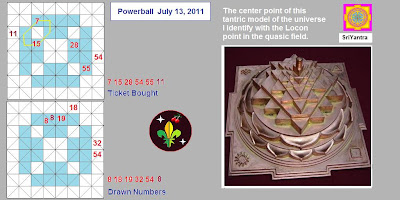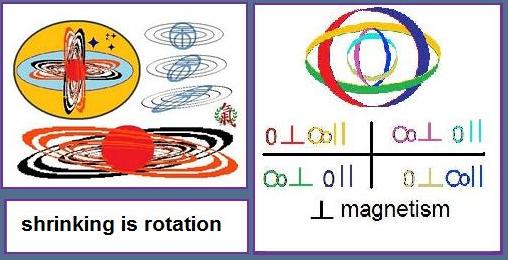
Synchronous Physicality (Statistics and Super-naturalized Core Methods) L. Edgar Otto July 14, 2011
I find it interesting Lubos http://motls.blogspot.com/2011/07/stationarity-fallacy.html?utm_source=feedburner&utm_medium=feed&utm_campaign=Feed%3A+LuboMotlsReferenceFrame+%28Lubos+Motl%27s+reference+frame%29 has a discussion on economics, Brownian motion, related to my general topic of today.
* * *
A Comment to a Commenter on Interesting Dialog on this Blog:
http://blog.vixra.org/2011/07/09/higgs-exclusions-at-900pb/#comment-9003
Mr. Nothing,
I acknowledge your post here as being very close on the right track of how we should enhance the new physics. The truths in science should not be a private thing in which ideas can be considered as something one can steal- can anyone patent the universe?
I have some of the same sort of thoughts lately on my blog efforts. Perhaps there are as many true theories as their are some many world statistics to consider, and each one has a graph that strives for actuality to control the evolving scientific consensus.
But no one seems to have recognized the deeper core of the problem and why some things we have not found- if we do not then the bloggers at least have alternative explanations- yet these do not seem to resonate with some minds talking to the empty wind- so I, another not particularly anybody myself has heard you.
The PeSla
* * *
Synchronous Physicality
It is in correspondence, an averaging, that human consciousness puts patterns together in space and time. This is close in the dealing of cards while nature hold close hidden values in her heart, her mathematics and physics.
So we sometimes, not ultimately sure of the reality or scene of the message, make too much or too little of coincidence, that lesser part of the possible, so make sustaining myths in rhymes and reasons, express our centering and our reaching out through freedom and paths as history and facticity.
As theory and experiment advance to higher expertise and complexity we become aware this faculty of sentient beings in many areas is more complicated than we have heretofore imagined.
What awakens us out of some age of slumber is the self-fulfilling animism of what we fell and often respond with humor or horror, that we feel or know as certain, expected, obvious, and real of nature's laws and the "otherness" of our generations intuitions of wider worlds and accepted stories of angels, aliens, and other hopes and fears as if ghosts we can imagine sustain our haunt us. We sensitive creatures as artists or the scientifically curious.
* * *
These contemplations and looks, the questioning, into a wider background of things in a mathematical and philosophic perspective has me questioning the foundations again and the role of chance in this world. I am not content with some vague idea of when things reach some sort of chaos science that has intelligible rules- yet I can question if we tame such non-linear dimensions, if it is possible that our ideas of a probabilistic space is a little too narrow a vision if it exists at all from one philosophically extreme view- but if it does not then how would this relate to whatever model we may entertain of the cosmology and physics- and even of the phenomena we regard as rather vague and psychological- outside of clear standard science really.
But in raising these issues in terms of my state lottery, the Power Ball in this case which has 59 numbers to choose five of them and one more that can be one of the five, I cannot ignore the fact, or experience, as improbable as it is that I have had a sort of extrasensory relation to the lottery the few times I played it interested in the chance of expanding my money, the need to help others, or the shear experiment of the math of it. These effects seem to almost depend on the belief at the time- or the ignorance of questioning such traditional myths.
While I do not think I can influence the outcome of what happens with say a scratch ticket- I am half convinced it can change before it is scratched off- and after all this is no more absurd than some conclusions from the quantum theory. We can even accommodate some thoughts on time past present and future involved in this as if all the situations can be changed from any time loop or perspective.
Of course some games can be so unlikely that other than those who play- assuming that the random numbers chosen are more likely, that someone of the set has to win eventually- but the point is you would win nothing even if you are near the break even point with the bank. Yet we can imagine situations where there is some method to narrow the computed probabilities, ones not found in the scope of current physics including the heart of quantum theory and computation.
In the past I have had luck with dice designed to work with the lottery games and involving the usual possibilities of their contents and group theory of rotations. A way if you will to try to follow, independent of some history, better outcomes from some casting. Today I tried it for the first time in years to buy a ticket and narrow it down to the sets of 24 numbers in the manner of yesterdays posting. This was not a bad use of a dollar for the sake of theory. The Power Ball seems to me a unique concept as how we treat say certain physics interpretations of the diagonals of a matrix, eigenvalues and all that... but in the general scheme of things we should think of the power ball as if such a diagonal as a zero vector. I wonder in fact if in the system of axes in a dimension if they are more likely to be different rather than the same in some combination's- certainly the laws of physics seems to be simplified in this manner when we understand or ask about what is an actual case we regard as the reality, at least from our own view or centering of things.
So I asked these questions to think about or keep in mind for later:
*0 - Lokon (from the volcano today in Indonesia, or Loco, crazy or place, the coordinates of the power-ball in a quasic field of 64 or so of them) a point-infinity unique "centering" in (super-)probability space.
*1 - The idea of a global summation, fixed and dynamic, Lokons in a God'seye view (perhaps philosophically literally).
*2 - The question of quasi-locality and quasi-actuality as conscious interaction between actualities and this lokon-godseye perspective.
*3 - Uniqueness of a given probability in the 240 quason structure or the further generalization or even collection of them, and thus the many-world and multi-verse issues.
*4 - The quasi- actuality of a pattern as solutions or protections of encoding's.
*5 - The question of exceeding changes and experience for the totality of the system.
*6 - The relationship to QM concepts and the deep connection to pi itself as probability and topology in general if any.
* * *
Today's facebook status:
L. Edgar Otto
It is not replication that makes us mortal, nor if we do not find love that matters. It is the loss of love that makes us mortal. Yet, as rare as a true mystic vision if we survive the loss we can become like the gods.
* * *

Interestingly I got some feedback from our coffee house best chess player (we have long since ceased to play the game but get deep into theory) as I ran by some of these abstract structures for the hopes at least for some advantage in the playing as a psychological game. A novel conclusion is the obvious observation that chess is more complicated than power ball and winning that is of course less of a chance than so many getting struck by lightening. What does this say for all our explorations in trying to understand what is happening in six dimensions? But if by the rules of the game it was all random then our worse player could conceivably give him a sound thrashing a lot more often than the deep sampling of statistical space. But here again we are at the border of foundations- for I have often felt, and it is almost a convincing feeling, that we make blunders in the game once the minor obvious errors general openings and rule are mastered, because the player slip back and forth into parallel worlds wherein a chess master can be inept briefly as if he but randomly had master so much less of the game.
* * *
This seems relevant to my topic today. Something it is good to take into account with the list of other uncertainties, along the lines of we find patterns we look for, perhaps. It is good that such philosophy is kept in mind by those responsible for the research the knowing which seems to me evidence that the human element in enquiry is alive and well. Still, it is not clear to me we can hold it in our heads at the same time when more is less or less is more- something one might say of the simplicity we find in higher dimensions for physical theories or the surprising complexity that can arise from more restricted general symmetries. We are the final observer between the remote scales of physics- but in that quasi-certainty how do we feel secure our views are unique?
http://www.quantumdiaries.org/2011/07/15/more-is-less/
I quote from this the fine distinction between the uncertainty of theory models and that of "systematic uncertainty."
"The final uncertainty, the systematic uncertainty, is the one that keeps physicists awake at night. It’s what we all fear. These kinds of uncertainties enter into our work at every step, they can take months to evaluate, they can spur long and sometimes fierce debate and they can be the center of controversial discussions. Every time we manipulate the data set in any way we bias our measurement somehow. Even worse, there’s no easy way of knowing how many systematic uncertainties there are and if we have taken them all into account."
* * *


No comments:
Post a Comment